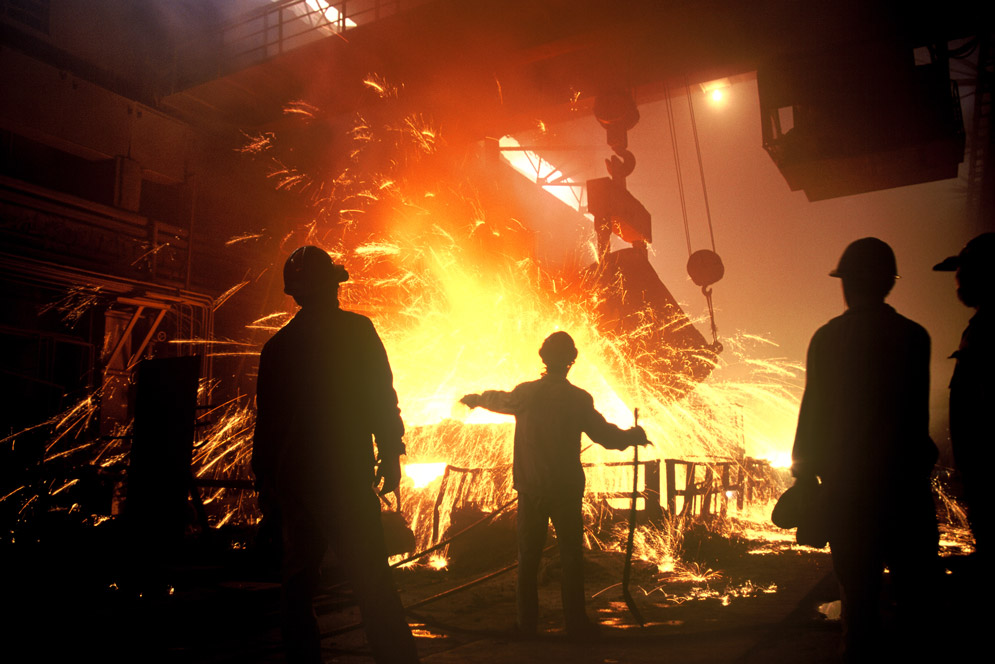- BU economist opposes Trump tariffs on steel, aluminum
- Stefania Garetto says costs will rise for industries using those metals
- Trump exempted NAFTA partners Canada and Mexico
You won’t steal our steel sales anymore. That was the essence of President Trump’s message to the world when he recently raised tariffs on steel imported into the United States and imposed a smaller hike in tariffs on imported aluminum.

Economist Stefania Garetto says tariffs to address the US trade deficit carry too high a price in lower economic activity. Photo courtesy of BU
The tariffs—rising by 25 percent on steel and by 10 percent on aluminum—exempt several allies, including Canada and Mexico, with whom Trump hopes to renegotiate the North American Free Trade Agreement (NAFTA). But the import levies brought howls of complaint from free traders among Republicans and other nations, not to mention Trump’s own chief economic advisor, Gary Cohn, who resigned in protest over the tariffs. On March 22, 2018, Trump imposed other tariffs on Chinese imports in retaliation for that nation requiring many foreign businesses to share their technology with the Chinese government before doing business there.
Is Trump right that competitors have unfairly undercut American steel and aluminum industries? Bostonia put the question to Stefania Garetto, a College of Arts & Sciences associate professor of economics, who studies international trade, particularly multinational corporations—their formation, operations, and links to economic activity.
Bostonia: Are Trump’s tariffs a good idea?
Definitely not. In economic theory terms, tariffs are frictions that distort economic activity, so they are never good for the economy as a whole. To be more specific, a tariff on steel imports will have the sure effect of raising steel prices in the United States. If before the tariff imposition steel is imported, it means that the foreign price is lower than the domestic price. A tariff will artificially increase the foreign price, maybe increase domestic purchases, but all the industries that use steel are going to lose. Only steel producers may gain from this.
One of Trump’s mantras is that the United States has been taken to the cleaners by unfair trade deals for decades. Is there any truth in that?
My view is that—like many of this president’s statements—that is an exaggeration. The legitimate concern is that some countries have been artificially tweaking their terms of trade through currency manipulation. But I would not go as far as calling it decades of unfair trade deals. There is plenty of evidence, for example, that the United States has gained from the signing and implementation of NAFTA.
The president also says tariffs will redress what he calls an unhealthy US trade deficit. What about that argument?
Sure. At the cost of higher prices and lower economic activity. Not sure it is worth the deal.
Critics say Trump is inviting a damaging trade war. Do you agree? If one does break out, can we win, as the president claims?
No one wins from a trade war. If the United States raises tariffs and other countries retaliate, not only will prices in the United States increase, but exports will drop, and with them GDP.
In the 19th and early 20th centuries, the US economy grew mightily under high tariffs. Today, Trump’s not alone in his views; Bernie Sanders says globalization, including free trade, has hurt American workers. Can a reasonable person support tariffs and protectionism, and do any reputable economists support them?
The problem here is the distinction between the aggregate and distributional consequences of free trade. While free trade tends to benefit the economy on average, workers in certain sectors—the less competitive sectors, more subject to import competition—lose from free trade. Naturally, the anti-globalization rhetoric appeals to those segments of the labor force that are more prone to import competition, so yes, reasonable workers can see the negative effects of globalization on their own employment or salaries and be against it.
But as economists, we need to be able to understand that there is a balance between aggregate and distributional effects, and that, on aggregate and in the longer run, the benefits outweigh the costs. I think that no reasonable economist can support these protectionist policies, but of course that’s only my opinion.















































Related Stories
BU Economist: Inequality Is Real, but Overstated
Kotlikoff’s latest research takes a different tack
President Trump: How He Won, What Will He Do
BU experts weigh in on portents of 2016 election
The Fallout from Trump’s Paris Accord Withdrawal
BU experts analyze decision to leave climate change accord
Post Your Comment